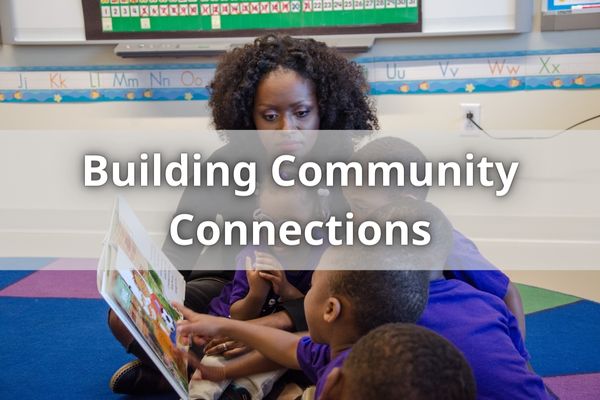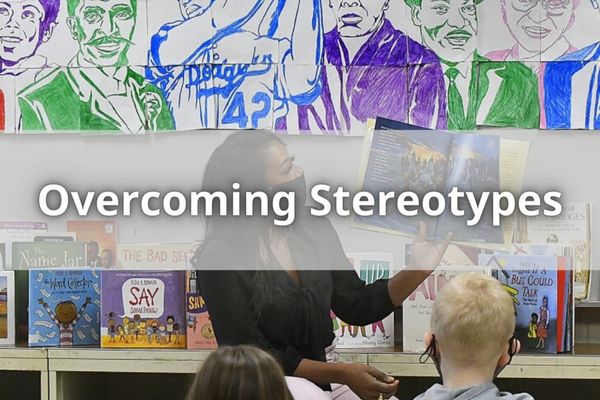African American Women In Teaching Careers: Breaking Barrier
African American Women In Teaching Careers: African American women have had a long history of success in the field of teaching, despite facing discrimination and prejudice. From the first female teacher to break barriers in the early 19th century to today’s educators who continue to make an impact, these inspiring women deserve recognition for their contributions.
In this article, we’ll explore how African American women have been trailblazers in educational settings throughout history and how they’ve helped shape the future of teaching.
Historical Barriers To Education
African American women have faced numerous obstacles throughout history when it comes to pursuing careers in teaching.
The onset of the Civil War brought with it both emancipation and educational opportunities for African Americans, but Jim Crow laws after Reconstruction pushed these rights away again. Despite this repression, many African American women bravely took up the mantle of education and sought to impart knowledge and understanding on younger generations.
This leadership was often met with a great deal of pushback from whites unwilling to give up their power structures; black teachers were paid substantially less than white counterparts and frequently denied promotions or access to better schools. In some cases, they had no choice but to take jobs at all-black schools that lacked basic supplies and resources necessary for effective instruction. Nonetheless, these amazing people overcame adversity and served as an inspiration for generations to come.
Even today, there is still much work to be done in the area of equal opportunity in education, but African American women are more committed than ever to removing obstacles and ensuring that everyone has a fair shot at success.
Role Models In The Profession

Mentorship is so important for African American women in teaching careers; having a role model to look up to can be incredibly encouraging and inspiring. Diversity in the classroom is also paramount for these women, ensuring that everyone is included and respected. Leadership is a key skill for these women to develop, and community involvement is a great way to hone these skills and demonstrate their commitment to the profession.
Mentorship
When it comes to mentorship for African American women in teaching careers, role models are essential. They provide guidance and support for those coming into the profession, showing them that success is possible.
It’s not just about having somebody to look up to; many of these mentors also offer tangible advice on how to navigate the often tricky terrain of being a teacher while keeping your identity as an African American woman at the forefront. Through their own stories and experiences, they can help new teachers stay focused on their goals and thrive in this career path.
It’s important that we continue to recognize these amazing individuals who have made such an impact on our education jobs system!
Diversity
In addition to having mentors and role models, it’s also important for African American women entering the teaching professions to recognize that diversity is key.
To guarantee that kids get the greatest education possible and may gain from various viewpoints in the classroom, it is important to have a varied group of professors. We must keep expanding the diversity of our schools to ensure that every kid, regardless of origin or identity, has access to high-quality educational opportunities. By creating an inclusive environment, everyone in the profession can feel supported and valued while they pursue their educational goals.
Let’s strive towards greater representation in our classrooms!
Leadership
Leadership is another important element to consider when discussing role models in the teaching profession.
We need mentors who can provide us advice and support as we advance in our jobs as African American women. Being able to look up to someone who has excelled in their area may be tremendously motivating and encouraging.
We should also seek out opportunities to lead within our own circles, so that other minorities have a voice and representation at the decision-making table. This will allow us all to create positive change together and ensure diversity remains an integral part of the education system.
With this kind of leadership, everyone’s voices are heard, which ultimately leads to better learning outcomes for our students.
Challenges In The Classroom

Let’s talk about how teacher bias and student disrespect can both present challenges for African American women in teaching careers.
We’ll discuss how these issues can create difficult situations for them and how they can be addressed.
Teacher Bias
It’s heartbreaking to think that African American women in teaching careers are subject to teacher bias, simply because of the color of their skin.
Despite initiatives and legislation aimed at preventing it, discrimination still exists in classrooms across America. For those who are affected, the results can be disastrous. African American educators may find themselves being passed over for promotions or even dismissed as a consequence of discrimination, which not only deprives pupils of the opportunity to learn from a broad set of teachers and gain from various ideas.
By teaching children about racism and sexism in the classroom, we can begin the process of educational equality so that everyone has an equal chance to succeed.
Student Disrespect
It’s not only teachers who are facing discrimination in the classroom; students can also be on the receiving end of unfair treatment.
One major challenge many educators face is student disrespect, which can manifest itself in various forms such as talking back to teachers, refusal to follow directions or acting out during class. If left unchecked, this type of conduct has a detrimental effect on learning and can cause even more disturbance in the classroom.
In order to handle this problem with their pupils in a way that promotes constructive debate and acceptable behavior on both sides, educators need to create a respectful environment. In order for everyone to feel secure and supported inside the educational system, it is critical that schools develop policies that encourage healthy connections between students and staff.
Building Community Connections

Let’s start by talking about networking opportunities for African American women in teaching careers. What resources have been helpful for making connections with other professionals?
Additionally, let’s discuss mentorship programs that African American women have taken advantage of. What are a few advantages of these programs?
Networking Opportunities
Networking opportunities are essential for African American women in teaching careers to gain the support they need. Making connections with coworkers and other professionals in the field may lead to the provision of priceless resources, support career progress, and offer up fresh opportunities.
A wealth of information on professional development, educational research, job postings, and more is available from professional organizations like the National Alliance of Black School Educators (NABSE) and The Association of Black Women Historians (ABWH), all of which are dedicated to assisting African American educators in succeeding.
So don’t be afraid to reach out and build connections! Whether it’s through attending events, joining groups online, or simply chatting over coffee; take advantage of these networking opportunities whenever possible – you never know who may help you along your journey!
Mentorship Programs
Mentorship programs are also a great way for African American women in teaching to get the support they need. Having a mentor who has already gone through similar experiences and can provide valuable advice is essential for success.
Mentorships provide an opportunity for professional growth, career guidance, and knowledge transfer. Plus, having someone who understands your unique situation can be incredibly empowering!
So if you’re looking for more connections or want to expand your network of resources, consider joining a mentorship program today. You never know what doors it may open up!
Navigating Unconscious Bias
Let’s start by talking about identifying bias against African American women in teaching careers.
Then, we can discuss ways to counteract bias and create an equitable workplace.
Identifying Bias
As African American women in teaching careers, we must be aware of the unconscious bias that exists within our profession.
We need to make sure that hiring decisions are based on qualifications and experience, not preconceived notions about race or gender. To identify when unconscious bias is at play, it’s important to look for patterns that could indicate prejudice such as hiring people with similar backgrounds or experiences rather than taking into consideration a wider range of perspectives.
Taking proactive steps like creating diversity committees and workshops can help address any potential issues before they become an issue. It’s essential that we work together to create an environment where everyone feels safe and accepted regardless of their background so all students have access to quality education.
Counteracting Bias
In order to prevent racism in the classroom, we must focus on ensuring that our kids feel heard and valued.
We can do this by promoting fruitful dialogue among people of various backgrounds and by building a friendly atmosphere where everyone is free to express their opinions without worrying about prejudice or condemnation. Every kid should have the same chance in an open atmosphere in our classrooms, regardless of their gender or color.
By addressing any negative comments or behavior quickly, we can help ensure that all students are treated fairly and with respect. Regular training sessions on unconscious bias can also go a long way towards creating a more inclusive teaching atmosphere for African American women educators.
Dealing With Discrimination

Identifying discrimination can be tricky, but it’s important to look out for subtle signs like being passed over for promotions or not being invited to important meetings.
Fighting discrimination can mean speaking up about any mistreatment you experience and demanding to be treated fairly.
Combating discrimination requires a collective effort, so it’s important to join forces with other marginalized groups to advocate for equality and justice.
Identifying Discrimination
Discrimination in teaching careers for African American women is a pervasive problem.
In order to successfully address and combat this issue, it’s necessary to first be able to identify instances of discrimination when they occur. This can be done by closely observing how people interact with each other in the workplace and noting any discrepancies between how African American female teachers are treated compared to their peers.
For example, if one particular teacher receives more criticism or harsher feedback than others despite similar levels of performance, then there may be an underlying bias at play that needs to be addressed. Additionally, pay disparities should also be monitored in order to ensure everyone is receiving fair compensation based on qualifications and experience rather than race or gender.
Recognizing discrimination when it happens is essential for creating a truly equitable work environment where everyone feels respected and valued regardless of background.
Fighting Discrimination
Now that we have identified the discrepancies in how African American female teachers are treated, it’s time to take action and fight back against discrimination.
This can be done through both legal means such as filing a complaint or lawsuit if necessary, but also by challenging unfair policies and practices internally within the organization itself. Taking steps like increasing diversity among leadership positions, creating fair hiring processes, or providing additional training for staff on recognizing implicit biases can all help create an environment where everyone is respected regardless of their race or gender.
We must never forget that while there may be obstacles standing in our way, together we can make sure no one faces discrimination because of who they are.
Combating Discrimination
To combat discrimination, we need to take action and make sure everyone is respected.
This can be done through legal means such as filing a complaint or lawsuit if necessary, but also by challenging unfair policies internally within the organization itself. We should focus on increasing diversity among leadership positions, creating fair hiring processes, and providing additional training for staff to recognize implicit biases in order to create an equitable workplace where everyone feels valued regardless of their race or gender.
It’s important that we come together and fight against discrimination so that no one has to experience it ever again.
Overcoming Stereotypes

As a Black woman in the teaching profession, it is easy to feel like an outsider. With stereotypes perpetuated by society, media and even other teachers, African American women often have to fight twice as hard to prove they belong in the classroom.
Despite these challenges, many of us remain resilient and determined to make a difference for our students. We strive each day to be seen not only as educators but also mentors that are capable of providing guidance beyond academics. We aim to serve as role models for our students who may not see someone who looks like them in positions of power or leadership.
To do this we must continue challenging traditional views that limit what can be accomplished by black women in education. From pushing back against negative assumptions about intelligence levels and work ethic to advocating for equitable treatment within the school system, we demonstrate strength and courage when faced with adversity.
This helps cultivate traditions of success which will shape generations of young minds for years to come.
Leading Through Activism
As African American women in teaching careers, it is important to recognize the obstacles we have faced and continue to face as a result of preconceived stereotypes. We come from diverse backgrounds, with different experiences that make us unique and bring perspective to our work. The collective resilience has enabled us to persevere through many challenges.
Leading through activism can be an effective way for us to fight against systemic discrimination and create meaningful change. Here are five ways we can use our expertise:
- Speak out on issues related to racial justice
- Advocate for more equitable policies within educational institutions
- Lead discussions around bias and oppression
- Develop lesson plans that incorporate diverse perspectives
- Be a role model for students who look like us or share similar experiences
By making our voices heard and engaging in active resistance, we can help shape the future of education for generations after us. With this power comes great responsibility, but together we can build a brighter tomorrow for all children – regardless of race or gender identity.
Promoting Diversity And Inclusion

African American women have faced many challenges in the teaching profession. Despite these challenges, they persevere and work hard to succeed. Advanceing Black American women in their jobs now involves diversity and inclusion advocacy.
Recognizing that there are important racial and gendered concerns that need to be addressed in educational institutions is one method to achieve this. This entails actions like establishing anti-discrimination regulations, fostering a secure environment where all students feel accepted regardless of race or gender, and offering assistance to individuals who suffer prejudice.
Moreover, it entails using more fair recruiting procedures to provide African American teachers the same opportunity as their white counterparts. Furthermore, it is essential to provide professional development programs specifically designed for African American female teachers so they can develop their skillsets and advance further in their career paths.
These types of initiatives create an environment where everyone can thrive regardless of background or identity. With this kind of encouragement, we can ensure that every teacher feels supported throughout their journey while increasing representation among faculty members at all levels. By confronting our biases head on, we can make positive changes that foster equity and promote greater acceptance across our schools and universities—allowing African American women to reach new heights in their teaching careers without facing any unnecessary barriers along the way.
Creating A Culture Of Support
Creating a culture of support for African American women in teaching is essential to ensure they are successful and feel appreciated. It starts with creating an atmosphere that encourages open dialogue, collaboration, and mutual respect.
To do this, it’s important to:
- Ensure the workplace environment is free from discrimination or harassment
- Provide resources for professional development
- Encourage mentorship between more experienced teachers and those just starting out
By providing these elements within the work setting, African American women will have access to the tools necessary to succeed in their profession and excel beyond expectations.
This also helps create a sense of community where everyone takes part in fostering success for all involved – students, teachers, faculty members and administrators alike. With this type of positive reinforcement in place, African American women can gain essential skills needed to become respected leaders within their field.
Conclusion
We have the opportunity to have a long-lasting effect on our kids and their futures as African American female educators. To the maximum extent that we are capable as educators, we must seize the chances for professional progress that are open to us.
We can make sure that every student has access to a fantastic educational experience by building good connections with our coworkers, understanding the best ways to help our students, and possessing all of the skills required for success. Future generations of young people will be empowered by our commitment and hard work.







